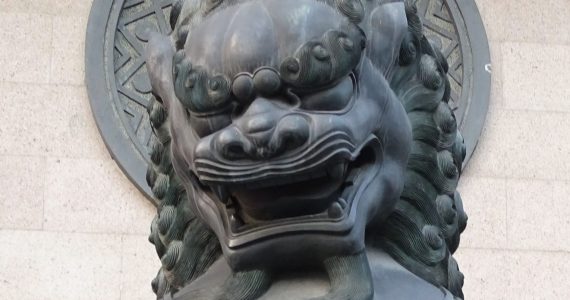
China’s Peaceful Rise? – A Public Diplomacy Strategy
Carrot and stick: The question of power
The transformation from threat to ‘benefactor’ has enabled China to talk the international community into thinking that it has both the ability and willingness to be a great power. It is deeply enshrined in “China’s new way”, propagated by Zheng Bijiang, Deputy Head of the Ministry of Propaganda, as early as 1978. The most dramatic change in other states’ reception of China can be identified in the developing countries of Asia and Africa. But this transformation is also becoming partly apparent in some industrialized countries – and results largely from the Middle Kingdom’s growing soft power. To evaluate this ‘weapon in Beijing’s foreign policy arsenal’, a clear definition is necessary.
Soft power, in contrast to Max Weber’s concept of power characterized by coercion, is based on the ability to attract people and to shape their preferences – Joseph Nye’s carrot and stick (Nye 1990: 153). Unlike “asserting one’s own will even against resistance” (Weber 1980: 28), attraction often leads to tolerance. The soft power of a country is based primarily on three resources: its culture (or the cultural aspects that are attractive to others), its political values (as long as it lives up to them nationally and internationally) and its foreign policy (if it is recognized as legitimate and has moral authority).
Public Diplomacy: „Propaganda work is spiritual work”
On the other hand, public diplomacy – as a means of promoting soft power – is understood as “a government’s process of communicating with foreign publics in an attempt to bring about understanding for its nation’s ideas and ideals, its institutions and cultures, as well as its national goals and current policies” (Tuch 1990: 20). Aptly referring to China, the aspect of influencing a foreign government by influencing its people can be added. Public diplomacy, as part of bilateral and multilateral diplomacy, thus serves different levels of expectations of the above-mentioned broad foreign public. “Public diplomacy is an important tool in the arsenal of smart power, but smart public diplomacy requires an understanding of the role of credibility, self-criticism, and the role of civil society in generating soft power” (Nye 2008: 108). It is therefore a struggle over winning hearts and minds.
The development of China’s public diplomacy must be seen in the context of the development of its diplomacy as a whole, as well as its economic rise and its political core interests. Usually, public diplomacy and foreign policy differ de facto in the instruments and objectives used. In the People’s Republic of China however, foreign policy, diplomacy and public diplomacy cannot be separated in the classical sense, what is mainly due to the historical significance of propaganda work.
China’s public diplomacy tools
Based on this framework, five categories of Chinese public diplomacy are served: information diplomacy, cultural diplomacy, exchange diplomacy, financial diplomacy and elite diplomacy. The Chinese government chooses the means according to its needs in order to drive bringing positive messages about its own culture, values and attitudes to the public forward.
Information and cultural diplomacy are graded as ‘classic one-way communication’ in the sense of a push-strategy. The broad audience is reached by the commercial sector – painting and calligraphy, literature, traditional Chinese medicine and Chinese cuisine – through institutions like radio broadcasts, international television and, with regards to the promotion of the Chinese language, Confucius Institutes. In the media sector, Xinhua News, a mouthpiece of the Communist Party of China (CPC), is particularly noteworthy. According to founding father Mao Zedong, the agency’s raison d’être was above all to send journalists abroad and let the world hear China’s voice (Custer 2018: 8). In 2020, Xinhua News runs more than 170 foreign offices through the use of local media. The non-governmental organization Reporters Without Borders classifies Xinhua as “the largest propaganda agency in the world” (Reporters Without Borders 2005), which is nothing more than the lynchpin of state media control. Another field of cultural propaganda is the dissemination of Confucian values, which still form Chinese society today and which structurally shapes the way relationships are build.[1]
In comparison, financial diplomacy, exchange diplomacy and elite diplomacy are part of the ‘two-way communication’ in the context of push- and pull-strategies. The first is limited to the four categories that are most visible to citizens as well as Heads of State or Government: Infrastructure investment, humanitarian aid, budget support and debt relief. In the East Asia Pacific region alone, funds from 2000 to 2016 amounted to over USD 48 billion – a sum, only fundable because of Beijing’s massive economic power. The latter strengthens personal relationships both on social and management level, which are closely linked to the academic work of the Confucius Institutes and their awarding of attractive scholarships. According to UNESCO, 178,271 students spent an exchange semester on mainland China in 2018 – more than twice as many as in 2012. 193 universities offered Confucius scholarships to students of various disciplines, partly tied to the condition of promoting Chinese language training in their respective home country. Lastly, twin cities are also subsumed as exchange diplomacy tools, since they strengthen interaction between representatives of the local economy and their Chinese counterparts (Custer 2018: 12).
Self-portrayal
The CPC’s own account of its diplomacy strategy differs in part considerably from that of Western authors (Jin et al.: 2017). As a global player, the People’s Republic would pursue values such as peace, fairness, justice, democracy and freedom, without subordinating its own core interests to any of these values. Security and cooperation as well as innovation and civil exchange would be characterized by harmony, but not by uniformity. President Xi Jinping describes his country’s diplomacy as a gatekeeper of unity between stability and flexibility, located between justice and the pursuit of interests, and between words and deeds. Since partnership should not automatically equate friendship, a clear distinction between diplomatic relations based on trust, on the one hand, and strategically reciprocal relations, on the other, has to be emphasized. Xi’s increasingly proactive diplomacy is based on four pillars: Great countries diplomacy (aimed at rebuilding good relations with the United States of America, Russia and the European Union), neighborhood diplomacy, partnership diplomacy and global governance. In the course of partnership diplomacy, Beijing has meanwhile concluded bilateral or multilateral agreements with over 90 countries or organizations.
Conclusion
This analysis has provided an introductory insight into the mode of operation of Chinese soft power and public diplomacy in international relations. The marketing of one’s own culture, the approximation of one’s own values and the global expansion of economic influence can undeniably be regarded as overriding goals. The essential question in the assessment is which theoretical approach is appropriate.
Starting from an analytical perspective, Nye created clearly definable categories. However, his partially very simplistic separation into hard power and soft power can be criticized as too under-complex. In fact, representatives of the China-based academy argue that the identification of a power resource as hard or soft is not fixed from the outset, but rather depends on the perception and feelings of the respective actors in individual situations. While large parts of the hard power aspects are clearly located within the state, the allocation of soft power tools is often not so clear-cut.
Finally, it can be said that Beijing still feels a certain deficit of soft power: “While China’s economic prowess impresses much of the world, its authoritarian political system and mercantilist business practices tarnish its reputation” (Shambaugh 2015: 99). The structural problem results, however, is not in the lack of soft power, but in its instrumentalization for hard power – or, to put it bluntly, hiding hard power in a velvet glove. The “peace” in the country’s concept of a peaceful rise to superpower can therefore be called into question.
[1] Worth mentioning are guanxi and mianzi, multi-meaning words that most likely translate to ‘relationship’ and ‘face’. Guanxi relationships on an individual human level are based on reciprocity. Mianzi or prestige is given through social recognition and withdrawn through disregard. Both are essential for building professional networks.
Bibliography
Custer, Samantha; Russell, Brooke; DiLorenzo, Matthew; Cheng, Mengfan; Ghose, Siddhartha; Sims, Jacob, Turner, Jennifer; Desai, Harsh (2018): Ties that Bind. Quantifying China’s public diplomacy and its “good neighbor” effect, Williamsburg: AidData at William & Mary.
Jin, Canrong; Dai, Weilai; Zhou, Xinyu; Sun, Xihui; Wang, Shushen; Kang, Xiao et al. (2017): China’s Wisdom, China’s Diplomacy since the 18th CPC National Congress, Beijing: China Renmin University Press.
Nye, Joseph S. 1990: Soft Power, in: Foreign Policy 20 (80).
Nye, Joseph S. 2008: Public Diplomacy and Soft Power, in: The Annals of the American Academy of Political and Social Science (616).
Reporters Without Borders 2005: Xinhua: The largest propaganda agency in the world, Berlin.
Shambaugh, David 2015: China‘s Soft-Power Push: The Search for Respect, in: Foreign Affairs 94 (4).
Tuch, Hans N. 1990: Communicating with the world: U.S. public diplomacy overseas, New York: St. Martin’s.
Weber, Max 1980: Wirtschaft und Gesellschaft: Grundriss der Verstehenden Soziologie, 5. ed., Tübingen: Mohr Siebeck.
Disclaimer: The views and opinions expressed in this article are those of the author and do not necessarily reflect the opinion of IFAIR e.V. or its members.

Lara Natascha Bühler
Lara currently finished her last Master semester in Security Studies at Sciences Po’s Paris School of International Affairs, as part of her degree in International Relations – European Studies at Andrássy University in Budapest. She holds a BA in Economics and Sinology, studying at Shanghai Jiaotong University and working for the German Chamber of Commerce in Shanghai, where she conducted the Chambers’ Corporate Social Responsibility initiative. Lara is combining her research interest in China with EU policy making, focusing on Public Diplomacy, trade and foreign policy. A recent internship at the German parliament allowed her to further develop her practical experience.
